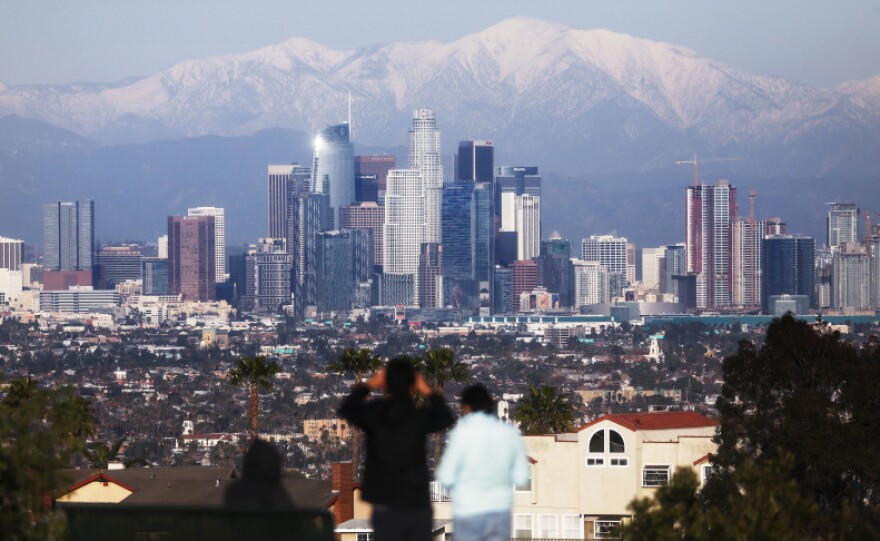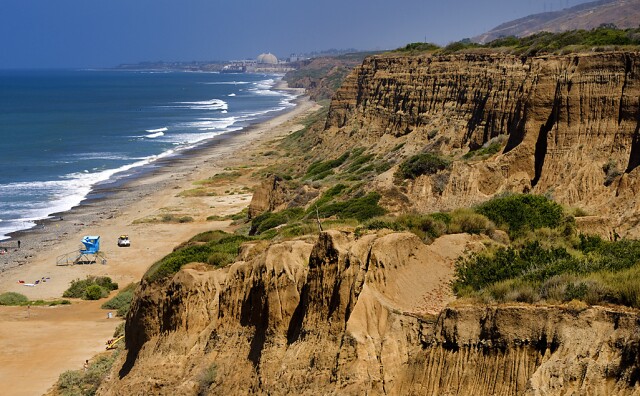Record-Breaking Lows And Highs During Winter. Is It The Climate Crisis Or Just Weird Weather?

From drenched Decembers to a record hot Super Bowl, we've seen winter on a rollercoaster in Southern California. But is it climate change or just weird weather?
Well, a lot of it does have to do with the climate crisis, according to Daniel Swain, a climate scientist at UCLA and The Nature Conservancy. The incoming cold weather might be making headlines, but Swain said the real symptoms of the climate crisis are the abnormal amount of record hot and dry days we’ve had this winter throughout the state.
“The ratio of record high temperatures to record low temperatures is very high and it's much higher than it used to be when it was roughly a 50-50 split,” said Swain. “That's a leading indicator of climate change regionally — seeing far more record warmth than record cold.”
That, on top of an extremely wet start to the winter followed by bone-dry conditions the last couple months, are all symptoms of the dangerous whiplash that human-caused climate change will increasingly create, Swain said.
Can you believe it? 84 degrees in downtown LA on Sunday and now this. #CAwx https://t.co/rDeZSXPSHq
— NWS Los Angeles (@NWSLosAngeles) February 16, 2022
In December 2022, the central Sierra Nevada saw record snowfall, but that precipitation declined dramatically in January and February, usually the peak of California’s wet season. The following January's rainfall in downtown L.A. totaled just 0.19 inches—that’s only 6% of the normal rainfall of 3.29 inches for that month, according to the National Weather Service.
Then there was the excessive heat watch issued for the week in February leading up to the Super Bowl, a rare event that will become more common if the planet continues to warm at its current pace.
“This is representative of what we expect the future to look like with these bigger swings and warmer temperatures,” Swain said.
Happy Meteorological Spring!!!
— NWS Los Angeles (@NWSLosAngeles) March 1, 2022
It was quite a dry Jan-Feb for #SoCal this year. For most of our climatic stations, it was between the 1st and 5th driest Jan-Feb periods on record. Here's the details:https://t.co/U8Hq0rYK9p
Some rain headed our way Thu-Fri. #cawx
California has always been a place of extremes, Swain explained, but humanity’s excessive pumping of carbon and other planet-heating gasses into the atmosphere is making that historically high variability even more volatile. It’s causing more regular record-breaking heat, and more intense, but less frequent, snowstorms and rainstorms — two of the biggest changes to winter weather resulting from human-fueled climate change, Swain said.
“The big lesson in California is that we need to be thinking about increasingly large swings in precipitation and water availability, not that it's going to be drier every year or wetter every year, but that if you look at conditions over a decade, we might actually see more years that are very wet and very dry,” said Swain. “These big swings are something we're really going to have to grapple with.”
That volatility has big implications for food, water and wildfires, Swain said. Unpredictable swings in temperature confuse plants and crops, causing them to flower too early or too late. When massive amounts of rain and snow are followed by hot, dry conditions, that threatens water supplies and complicates managing the vital resource. Low rainfall and ongoing drought drying out vegetation only adds fuel to wildfires.
With the start of spring likely to bring even warmer weather, appreciate the cooler temperatures this weekend — because, according to climate scientists, they’ll be more and more rare if the world doesn’t move faster to cut emissions and adapt to a rapidly changing climate.
-
Sandhill cranes are returning to the Lake Tahoe basin after a century long hiatus in what many say is a conservation success story.
-
Jackie’s partner, Shadow, refuses to abandon their unviable eggs, despite her attempts to nudge him along.
-
We do have some of the same types of buildings here.
-
Switching to an electric heat pump water heater can save you money and help the state avoid power outages.
-
The state's parks department is working with stakeholders, including the military, to rebuild the San Onofre road, but no timeline has been given.
-
Built in 1951, the glass-walled chapel is one of L.A.’s few national historic landmarks. This isn’t the first time it has been damaged by landslides.









